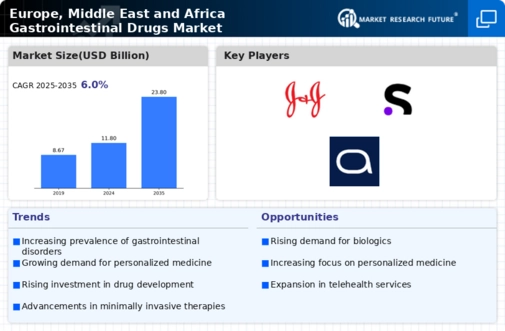Market Trends
Key Emerging Trends in the Europe Gastrointestinal Drugs Market
The market for gastrointestinal medications in Europe, the Middle East, and Africa (EMEA) is undergoing dynamic changes as a result of several variables affecting the healthcare environments in the area. Increasing Burden of Disease: One important market driver is the rising incidence of gastrointestinal illnesses. In EMEA, the prevalence of diseases, including gastroesophageal reflux disease (GERD), irritable bowel syndrome (IBS), and inflammatory bowel disease (IBD), is on the rise due to changes in dietary practices, aging populations, and lifestyle changes. Growing Awareness and Diagnosis: Early identification and diagnosis are being made possible by increased knowledge about gastrointestinal illnesses and better diagnostic tools. The need for efficient pharmacological treatments to control and treat these illnesses is growing as a result of this trend. Improvements in Drug Development: Current research and development initiatives are concentrated on producing novel medications with increased efficacy and fewer adverse effects. The field of gastrointestinal illness therapy is changing as a result of the introduction of innovative therapeutics, including biologics and targeted therapies. Investments in Healthcare Infrastructure: Better access to medical facilities and pharmaceutical items is being made possible by ongoing investments in healthcare infrastructure throughout EMEA. Consequently, this is increasing the need for gastrointestinal medications as a whole. Regulatory Environment: The market for gastrointestinal medications in Europe is significantly shaped by the constantly changing regulatory frameworks. Tight regulatory guidelines guarantee the effectiveness and safety of medications, promoting patient and healthcare provider confidence. Market rivalry: To profit from the rising demand for gastrointestinal medications, pharmaceutical firms are engaged in fierce rivalry in the market. Companies frequently engage in strategic alliances, mergers, and acquisitions in an effort to increase their market share and diversify their product lines. Pricing pressures and generic competition: The emergence of generic substitutes is changing the dynamics of the market, bringing in price competition and having an effect on branded medicine income streams. In order to keep a competitive edge, pharmaceutical businesses have been forced to concentrate on innovation and distinctiveness. Patient-First Methods: Preferences for drugs and treatments are being influenced by a move in healthcare toward a patient-centric approach. Patients' demands and preferences are being taken into account more and more by pharmaceutical corporations when developing drugs.






Leave a Comment